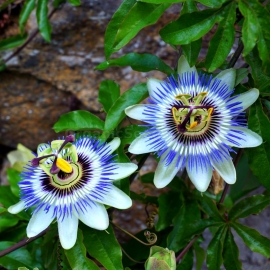 EXCLUSIVE
EXCLUSIVE






Organic Maypop Seeds (Passiflora incarnata)
3.00 €
Maypop, Passion Flower, Passion Vine - Herbaceous or woody vine, native to the southeastern and eastern US. The flowers are wonderfully large, three dimensional, complex, purple and white. The plant prefers full sun, dryish soils and a trellis.
-
Organic Maypop (Passiflora incarnata)
Maypop, Passion Flower, Passion Vine - Herbaceous or woody vine, native to the southeastern and eastern US. The flowers are wonderfully large, three dimensional, complex, purple and white.
The plant prefers full sun, dryish soils and a trellis. The first year or two, while the plant is getting established, you need to keep them watered and weeded. After that, you just provide a place for them to climb. Useful in making seasonal, living shade structures and for landscape/fence adornment. Traditional usage (TWM): sodorific. Plant prefers full sun and dryish soils, trellis.
These can easily be trained up a sunny wall on the porch to give seasonal shade, and the flower display is a big plus. Probably the best germination will be achieved by soaking seeds in warm water for 2 days, then nicking with a sharp blade and planting in warm conditions. Germination occurs within 30 days. However, other methods have long been used, such as giving the seeds a 30 day period of cold, moist refrigeration before planting in warm soil.
How to Grow
Passiflora seeds are known for long and stubborn germination. Seeds may be cold stratified for four weeks in the fridge prior to planting if desired. Natural cold stratification can be provided by sowing seeds outdoors in the fall. Other growers will prepare the seed by soaking it in water or juice for 24 hours prior to planting.
The acids in the juice are meant to help break down the seed coat. Vinegar has also been used for this purpose. Sanding the seed coat a bit may also help achieve a similar result. Plant the seeds about 1/2? deep in a damp, well-draining medium. Sowing in a moist paper towel that is placed in a zipper baggie has proven successful. Keep at a temperature of about 70-75 degrees Fahrenheit using bottom heat if possible. Germination can take several weeks to several months. Established plants prefer bright light.
